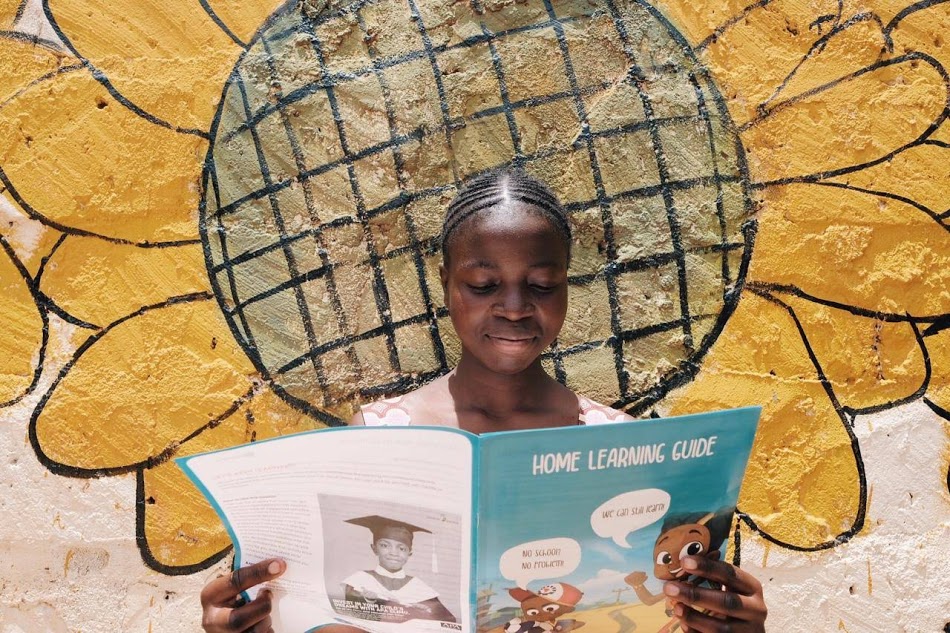Girl Rising Webinar:
A Global Conversation on the Impact of Covid-19 on Girls’ Lives
Tuesday, July 28, 2020
Girl Rising’s one-hour presentation and Q&A session brought together experts from the US, Guatemala, Kenya, and India, as well as enthusiastic youth activists campaigning for global girls’ education. The coronavirus pandemic is disproportionately affecting women and girls. They are at risk while at home and at risk of never going back to school. At home, they are stuck with chores and child care, and not able to explore their ideas and dreams. The public health and associated economic crisis could be a major setback to this cause, unless the world diligently fights for girls to return to school.
The video is well worth your time!
African Girls Can participated in the webinar on July 28th and shares some highlights.
Christina Lowery, CEO of Girl Rising said, “Community created micro-solutions are addressing the very real risks to girls’ education and girls’ futures during this time of school disruptions around the world.” For instance, (1) keeping girls proximate to and engaged in learning by delivering academic materials to them at home and (2) radio broadcasts delivering information about gender norms and the danger of following them at this time. In some places, girls themselves have become involved in producing the radio programs.
 African Girls Can has organized both of these approaches with the assistance of our Teacher Liaison at the school the girls attend and kind citizens with transportation.
African Girls Can has organized both of these approaches with the assistance of our Teacher Liaison at the school the girls attend and kind citizens with transportation.
Girl Rising is a leader in the girls’ education movement, working with Program Partners in 11 countries and using the power of story-telling to change the way the world values girls and their education. Through the organization’s documentaries, we meet actual young women to better understand the life limiting consequences of missing an education. 6,200 educators in 125 countries and all 50 states have registered to use Girl Rising’s films and free curriculum in their classrooms. By sharing their stories now during the pandemic, they can continue to express themselves and inspire others.
- What stories are coming out of this pandemic?
- What are girls going through?
- What are they looking forward to still? It is important to hold onto dreams!
Deborah Odenyi, Girl Rising Kenya Country Manager and former Headmistress of Kibera School for Girls summarized the situation in her country. In Kenya, early marriage is driven by poverty (families need the dowry money). Girls find themselves trapped in relationships with men just to be able to buy sanitary napkins. A survey conducted from Jan-May, 2020 in just 1 county in Kenya (there are 47 in total), determined that 4,000 teenaged girls had reported becoming pregnant. The President, Uhuru Kenyatta, was reportedly very alarmed and directed all community leaders to take responsibility for this problem. The Kenyan government has a goal of stopping the practice of Female Genital Mutilation (FGM) by 2022. The pandemic is proving to be a setback to this goal as movement around the country by medical professionals and social workers to spread awareness is limited.
 An organization called Sunflower Global has partnered with Metis and distributed an Offline Home Learning Guide geared to Grades One to Eight. It includes material in mathematics, literacy, and science, as well as creative, physical, and emotional health activities. Another partner called Big Picture Learning was already at the forefront of online teaching, so they have been able to continue to conduct three classes per week and provide data bundles for students so that they can access the sessions.
An organization called Sunflower Global has partnered with Metis and distributed an Offline Home Learning Guide geared to Grades One to Eight. It includes material in mathematics, literacy, and science, as well as creative, physical, and emotional health activities. Another partner called Big Picture Learning was already at the forefront of online teaching, so they have been able to continue to conduct three classes per week and provide data bundles for students so that they can access the sessions.
For more on the impact of COVID-19 in East Africa, listen to this podcast.
Nidhi Dubey, Country Representative of Girl Rising India spoke about breaking the myth of technology being the “equalizer of COVID-19.” In India, 320 million students are out of school. Only 11% of all Indians own a computer and just 8% of households there have both a computer and the internet. Assuming that girls have access to digital technology while out of school is not the reality. In partnership with Starbucks Foundation and HP, they are exploring the use of WhatsApp Integrated Voice Responses to reach marginalized communities.
The situation in other countries throughout the world, including Uganda, is certainly no different.
Gender equality is not just an issue for girls, but a human issue. It is imperative for everyone to change attitudes, craft new ways of being and new gender norms. Start by listening to girls’ dreams and aspirations, working with the “gatekeepers” (i.e. parents/guardians), and connecting girls with female role models and mentors.

